Hosting AgileDialogs inside a Portal
Home –> AgileDialogs design guide –> Hosting AgileDialogs inside portals
Hosting inside an IFRAME
To host AgileDialogs inside another application like an intranet site or portal, we need to use a standard HTML tag IFRAME.
<iframe
id="DialogsFrame"
src="<SERVER_URL>?orgname=<ORG_NAME>&DefaultProcessTemplate=<PROCESS_TEMPLATE>">
</iframe>
The following image show AgileDialogs running inside simple Intranet Site:
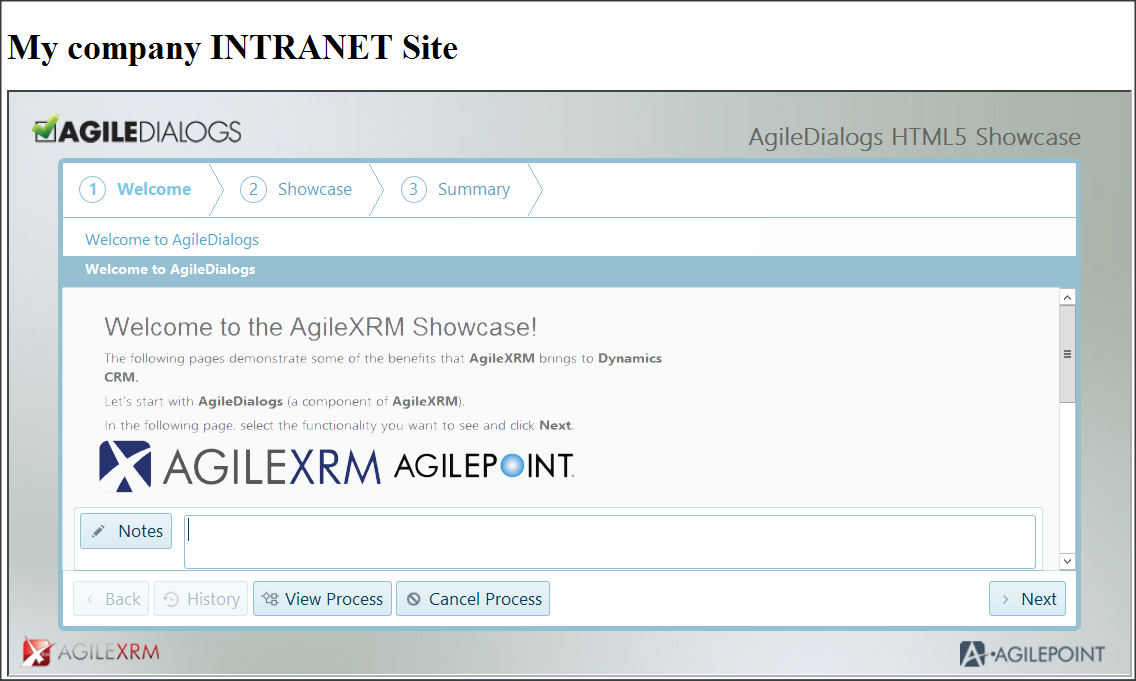
Use the hosted parameter to remove the AgileDialogs branding frame:
<iframe
id="DialogsFrame"
src="<SERVER_URL>?orgname=<ORG_NAME>&DefaultProcessTemplate=<PROCESS_TEMPLATE>&hosted=1">
</iframe>
The following image show AgileDialogs running inside simple Intranet Site without branding frame:
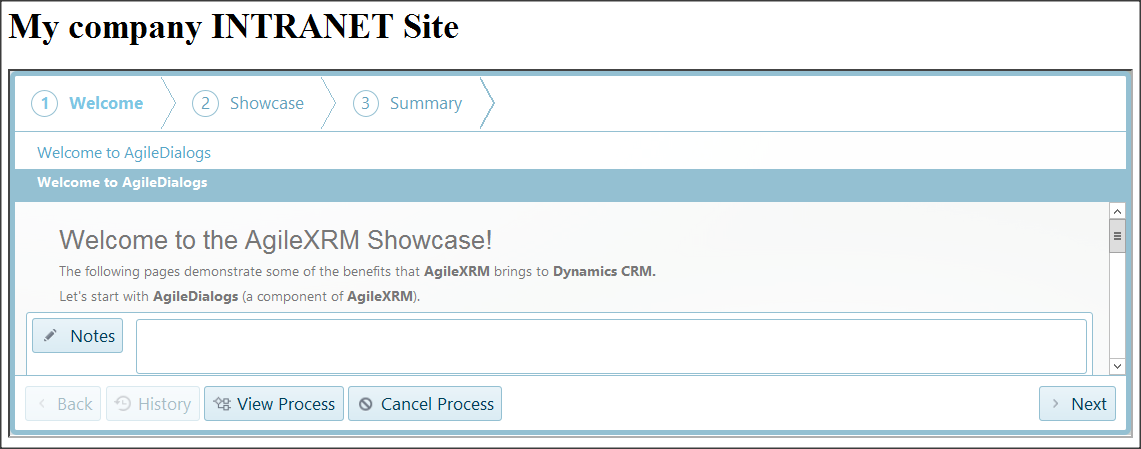
AgileDialogs messaging API
When AgileDialogs is running inside an IFRAME, it is possible to pass AgileDialogs data to the host application.
To do this, we need to follow these steps:
-
Set up Messaging in Enterprise Manager
-
Send messages from AgileDialogs
-
Receive message in hosting application
- Set up messaging in Enterprise Manager
For security reasons, we need to first enable the messaging API to a particular host in Enterprise Manager.
In Enterprise Manager main page click on Shared Custom Attributes, and create a new string item called AgileDialogsParentPortalUrl and set the value to the URL of the host site.
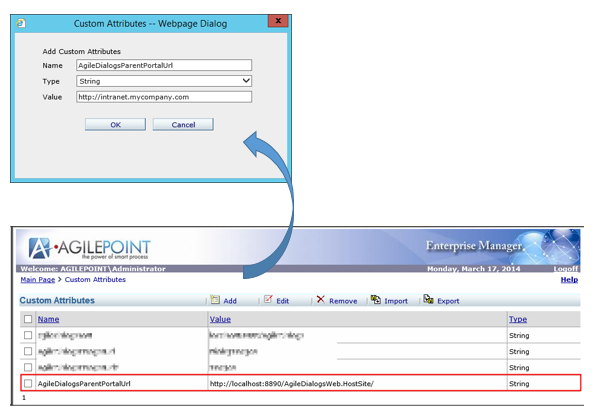
Send data to host site from AgileDialogs
To send data to the host use the DialogsEngine.postMessage method:
DialogsEngine.postMessage(<MESSAGE_KEY>, <MESSAGE>);
Where:
-
Message Key, is a literal to help identify the message in the host
-
Message, is the message we want to send. It accepts literales, arrays and JSON objects
On the receiving side, the host page that contains the AgileDialogs IFRAME, should subscribe to the message:
window.addEventListener("message", <HANDLER>);
Where:
-
Handler, is a javascript functiona that processes the data sent from AgileDialogs. This function receives an event parameter, which is a string convertible to JSON with following info:
-
message: contains the value of MessageKey set when sending the message
-
params: contains the value of Message set when sending the message
-
Example 1:
AgileDialogs OnLoadScript code:
DialogsEngine.postMessage("notificationKey", "The value to send");
Host page code:
window.addEventListener("message", function (event) {
// use JSON.parse(event.data) if not jQuery
var dialogData = $.parseJSON(event.data);
switch (dialogData.message) {
case "notificationKey":
window.alert(dialogData.params);
break;
default: // sample purpose!
window.alert("No listener for message:" + dialogData.message);
break;
}
});
Example 2:
Send the value of a control called txtName to the host, when its value changes.
AgileDialogs OnLoadScript code:
DialogsEngine.addChangeEventHandler("txtName", function (value,display) {
DialogsEngine.postMessage("txtNameChange", value);
});
Host page code:
window.addEventListener("message", function (event) {
// use JSON.parse(event.data) if not jQuery
var dialogData = $.parseJSON(event.data);
switch (dialogData.message) {
case "txtNameChange":
// use getElementById if not jQuery
// page requires a <div id="log" /> tag
$("\#log").html(dialogData.params);
break;
default: // sample purpose!
window.alert("No listener->" + dialogData.message);
break;
}
});
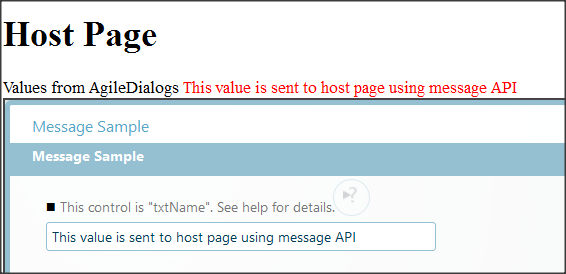
Receive data from host site
Also is possible to receive data from the host site, using the DialogsEngine.postMesssage with a function, using a third parameter:
DialogsEngine.postMessage(<MESSAGE_KEY>, <MESSAGE>, <CALLBACK>);
Where:
-
Message Key, is a literal to help identify the message in the host
-
Message, is the message we want to send. It accepts literales, arrays and JSON objects
-
Callback, function handler to manage received data from host site
To send data we need to set the notify property of event parameter and call the postMessage method of the IFRAME object.
Example:
AgileDialogs receive values from the host page.
AgileDialogs OnLoadScript code:
// this sample shows the returned data in textControl
DialogsEngine.postMessage("receiveDataKey", "", function (data) {
DialogsEngine.setSelectedValue("textControl", data);
});
Host page code:
window.addEventListener("message", function (event) {
// use JSON.parse(event.data) if not jQuery
var dialogData = $.parseJSON(event.data);
switch (dialogData.message) {
case "receiveDataKey":
// Set notify property to send data back to AgileDialogs
dialogData.notify = "This data is from host page";
// Get the IFRAME object
var iframe = document.getElementsByTagName('iframe')[0];
// Send the message to AgileDialogs
iframe.contentWindow.postMessage(JSON.stringify(dialogData), dialogData.source);
break;
default:
window.alert("No listener->" + dialogData.message);
break;
}
});
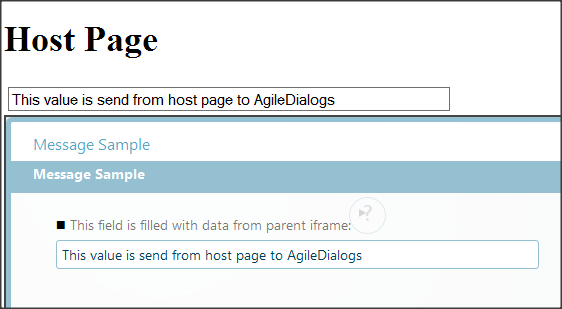
AgileDialogs lifecicle messages.
AgileDialogs emits messages to communicate it lifecicle status when its placed into a container iframe element.
If AgileDialogs is not hosted into iframe element, the messages will not been send
These are the message list:
- DialogsReady When AgileDialog page content frame is ready. This is the first message send.
{
"action":"DialogsReady"
}
At this time AgileDialogs is showing the loading spinner. Can use this message to remove any temporal CSS applied to container iframe to avoid a white block space in page while page is loading.
This message is not sent when AgileDialogs error page is displayed.
- app_loaded When AgileDialogs application is loaded.
{ "action":"app_loaded", "piid":"47fe6121314eee11b54c0050562195fa" }Ocurrs inmeately after
DialogsReadyproviding process instance id of executing dialog. This message is sent even if the AgileDialogs error page is displayed. - new_proccessinstance When AgileDiallgs process instance has been created.
{ "action":"new_proccessinstance", "piid":"47fe6121314eee11b54c0050562195fa", "startpiid":"47fe6121314eee11b54c0050562195fa" }It behaves differently depending on whether the AgileDialogs model contains a StartPage shape or not:
- If the model contains a StartPage shape this message is sent when the first AgileDialogs form has been completed and the next page is displayed to the user.
- If the model does not contain a StartPage it will be executed after app_loaded message.
- render_ends When AgileDialogs first form is shown and have finished its render.
{ "action":"render_ends" } -
This message is sent even if the AgileDialogs error page is displayed.
- AgileDialogs.DialogCompleted When AgileDialogs is completed.
{ "action":"AgileDialogs.DialogCompleted", "piid":"47fe6121314eee11b54c0050562195fa" } - AgileDialogs.DialogFaulting When AgileDialogs process is in Faulting status.
{ "action":"AgileDialogs.DialogFaulting", "piid":"47fe6121314eee11b54c0050562195fa" } - AgileDialogs.DialogSuspended When AgileDialogs process is in Suspended status.
{ "action":"AgileDialogs.DialogSuspended", "piid":"47fe6121314eee11b54c0050562195fa" } - AgileDialogs.DialogCancelled When AgileDialogs process is cancelled.
{ "action":"AgileDialogs.DialogSuspended", "piid":"47fe6121314eee11b54c0050562195fa" } - DialogErrored When AgileDialogs process triggers an error.
{ "action":"DialogErrored" }
Listening
window.top.addEventListener("message", function (event) {
var dialogData = JSON.parse(event.data);
console.log(dialogData.action );
});